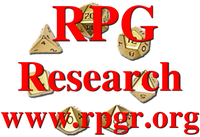Games & Resource Allocation Training - Examples of How So Many Conflate RPG, Games, TRPG, & CRPG.
These are excerpts from my critique of an article someone wanted to publish on the RPG Research site (and which I sent back as unpublishable unless the suggested changes were made.
While I rejected the article submission as written, they did bring up some interesting ideas about using games for training resource allocation, even though they had many errors and logical fallacies in their articles, some of the general concepts were interesting. The first wiley published article was grossly in error, and for something released in 2017, surprising just how flawed it was at a fundamental level misunderstanding what a role-playing game is. Confusing "role alllocation" in all games, as having to do with the roles in role-playing games.
1) Your article conflates games, and video games in general, with role-playing games. We have been working very hard to educate people about the important distinctions between, and the effects of, general video games, computer-based role-playing games, and actual tabletop role-playing games like Dungeons & Dragons, live-action role-playing (LARP) like Amtgard or Vampire, and solo adventure books/modules like Choose Your Own Adventure and the ebook/app equivalents.
3) The first article referenced has a number of issues itself, though if your article clarifies those issues, and corrects their mistaken terminology, it can minimize the "damage" done by the conflation.
https://onlinelibrary.wiley.com/doi/full/10.1111/geoj.12248
For example they intentionally conflate various games as RPGs, that aren't actually RPGs at all. Later in the article they clarify that although the writer is lumping the game into the category of RPG, they acknowledge (deep in the text) that it is actually a "livelihood game".
RPG when using the term correctly, is supposed to be synonymous with TABLETOP role-playing games, as they are the first to use that term and the original creation of RPG with Dungeons & Dragons, there is nothing extant prior to 1974's D&D. Many now incorrectly conflate computer-based (CRPG) and live-action (LARP) with RPG.
The Feldt et al 1972 references games in general NOT RPGs, but the article you link mis-references that repeatedly. Role-playing games didn't exist before 1974, and the term RPG didn't solidify until a little later.
They are effectively conflating turn-based & real-time STRATEGY GAMES like Axis & Allies, RISK, Company of Heroes, and Shogun: Total War, which are indeed more like resource management WAR GAMING, not at all ROLE-playing games (though the first RPGs evolved from wargaming, they
are importantly distinctly separate (see definitions listed later in this response).
They also reference articles from 1972 prior to the invention of role-playing games as a term, and years before the term RPG is used.
Their first reference in your linked first article to Feldt, Moses, & Eckroad (1972) is correct in that "3 elements that games, as training and planning tools, have in common: role allocation, scenarios, and accounting systems.
The author is showing a misunderstanding of the use of of the term "role allocation", that is not the same as a role playing game. Pretty much ALL games allocate a role of some kind (referee and player, dealer, etc.), that does not make them a role-playing game. But then the author later repeatedly mis-references that article as RPG, "RPGs are governed by explicit or implicit rules that help to represent reality (Feldt et al, 1972)." is just one of many mistaken references over-generalizing all games as RPGs.
Logical fallacy. Just because an RPG is a game, it does not mean all games are RPGs.
The Feldt article is a reference to games in general, _not_ what makes it an RPG.
That whole article unfortunately conflates the terminology further mashing computer-based RPGs with tabletop RPGs, further damaging RPG studies as a whole, so clarification is critical if reference the valid concepts within the article, while pointing out some of the flaws.
The second linked article, from Forbes, is almost entirely just about video games in general, it only once obliquely mentions (computer-based) role-playing games.
https://www.forbes.com/sites/capitalone/2018/04/24/what-can-the-world-of-video-games-teach-us-about-financial-management/#47b5bec42348
For the escapism references, you should include Jane McGonigal and her explanation about healthy escape versus unhealthy escape. http://www2.rpgresearch.com/blog/escapism-and-gaming
The fourth link, for FT Advisor, is also video game only and also no RPG reference, though I like that it reference's Flow State as an important component near the end of the article, as everyone who follow my lectures and training knows, and as a Recreational Therapist, Flow State is a very important component.
https://www.ftadviser.com/investments/2018/07/17/lessons-from-the-world-of-gaming-to-improve-financial-literacy/
To address these glaring errors of conflation, making the writer look completely ignorant, some minor tweaks can be done to show more savvy about these important distinctions and not further confuse people:
1) Adjust the misleading title to be more accurate to the content, something like: "Computer-based Games, including Role-Playing Games, Impact on Resource Management and Decision-Making", or "Games Impact on Resource Management & Decision Making", or "How Different Types of
Games Impact Resource Management & Decision Making".
2) Use the correct terms for the game type:
Defining definitions of RPG:
http://www2.rpgresearch.com/documents/wiki/glossary/rpg
- RPG = tabletop role-playing games in general, or just all types of
- RPGs as a whole, else use TRPG or TTRPG.
- TRPG = tabletop RPGs only.
- ERPG = electronic role-playing games (includes sub-types of computer-baed RPGs (video games, consoles, PCs, mobile, MMORPG, etc.)
- LRPG = live-action role-playing game (includes sub-type of LARP = live-action role-playing)
- SABM = solo adventure books/modules like Choose Your Own Adventure and similar electronic versions
Document Actions

